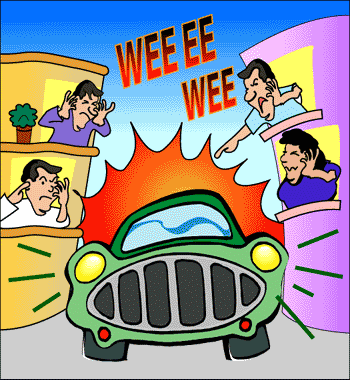 I think the car alarm's time has come and gone. There was a time, I think, when it was a useful device. You'd be walking across the parking lot, hear a horrific cacophony, and immediately think "Trouble! Where's my utility belt and cape?!" You KNEW something was not right in the world of automobile possession.
I think the car alarm's time has come and gone. There was a time, I think, when it was a useful device. You'd be walking across the parking lot, hear a horrific cacophony, and immediately think "Trouble! Where's my utility belt and cape?!" You KNEW something was not right in the world of automobile possession.Now, whenever you hear a car alarm doing its ear-rupturing sound cycle, you think "Will someone turn that damn thing off?" Car thieves have no reason to be afraid when that thing starts going off. Everyone is just sitting in their apartments turning up the TV or muttering under their pillows. Or if you are outside and hear the alarm, you just shake your head and feel proud that you trust your own car to look after itself.
So in that split-second when the car alarm was actually useful--you know, when people thought it was different and groovy, like "peace" in the 60s or "war" in the 2000s--the car alarm had a place in the dangerous criminal underworld as a protector of all that was steel, wheels, and yours. I lament the passing of the Car Alarm Era and shed some kind of metaphorical tear as we toss it into the Irrelevant Bin. Requiescat In Pace. Dona nobis pacem. Other Latin phrases of varying relevance, as well.









